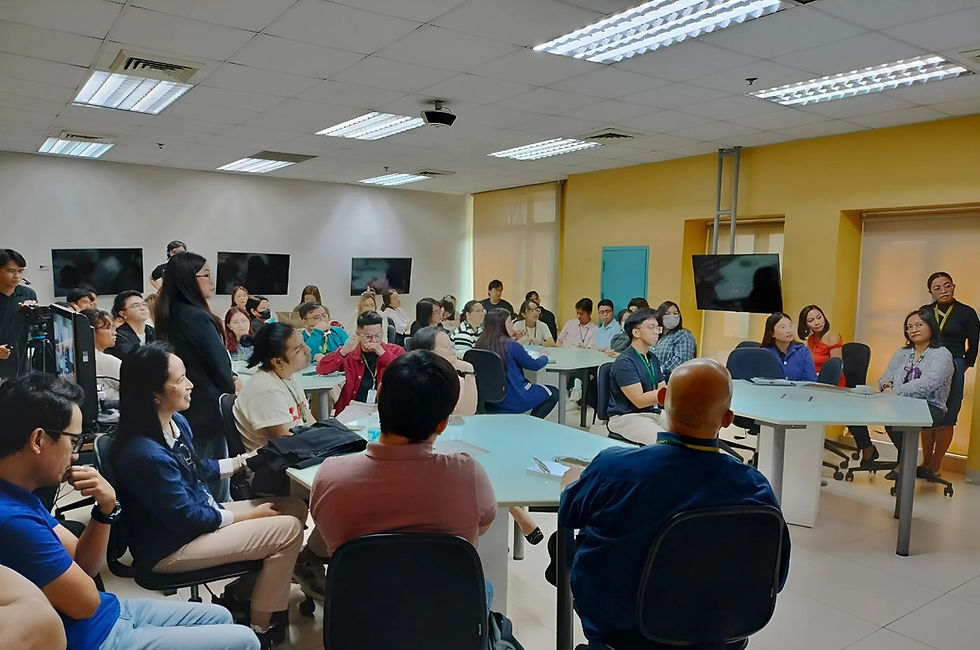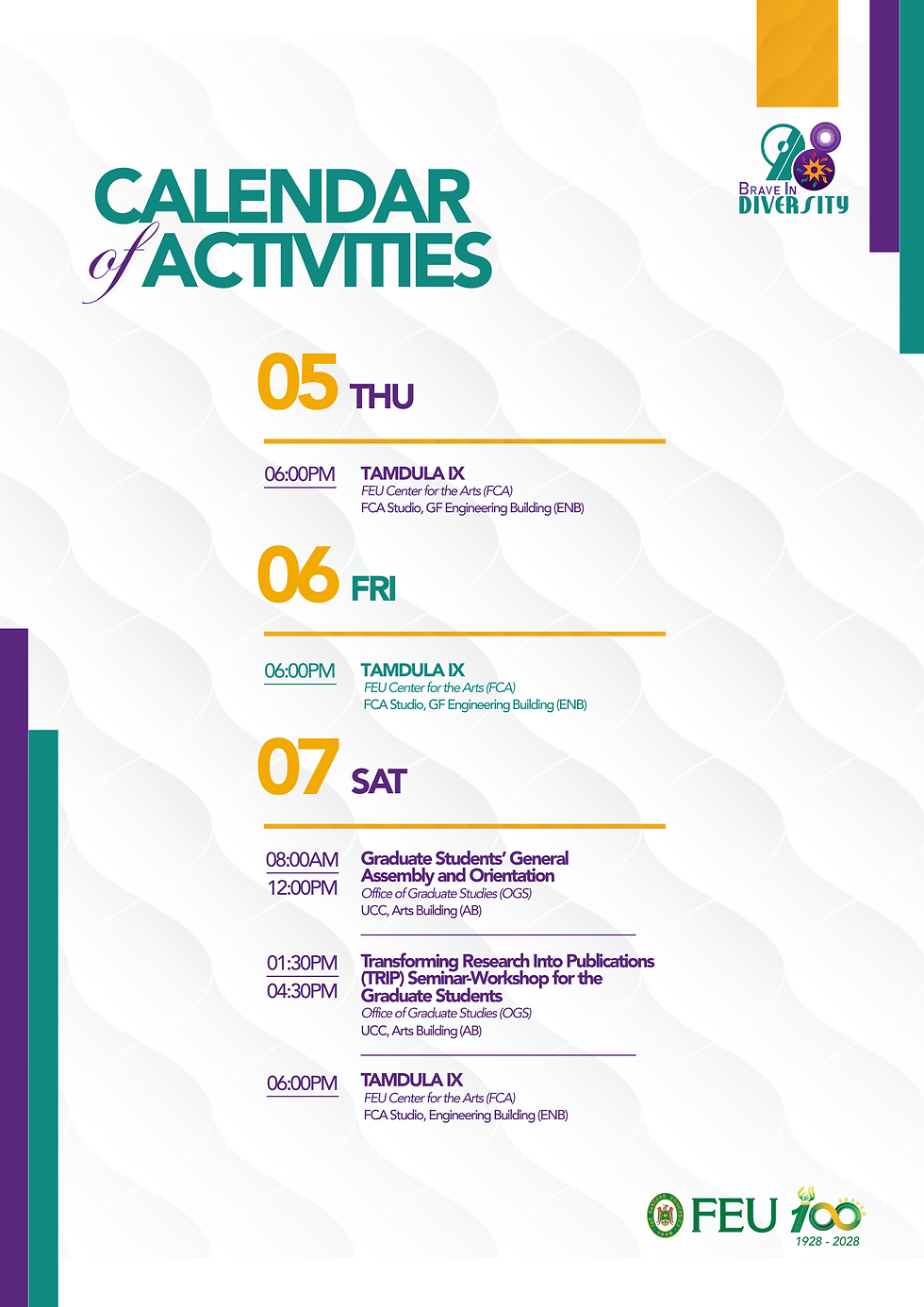Spaces for interaction and reflection
- Oct 30, 2025
- 5 min read

Far Eastern University (FEU)’s Learning Journey or FLJ is now Homeroom Advising-FEU Learning Journey under Student Development and Continuing Education.
Interaction Space (Homeroom) is a forum for students to discuss academic, personal, and career-related issues with their mentor while Reflection Space (Learning Journey) is a platform where students document their thoughts and progress through online modules and reflective assignments, often submitted and discussed via Canvas, the university’s learning management system.
How are students, its main stakeholders, experiencing Homeroom Advising-FEU Learning Journey?
“[This] has been all throughout my university life,” said Michael Jules Perez. “[It] has been beneficial in helping me know myself a little bit better.”
Perez added that interaction and reflection help students backtrack on the memories they had in the university and let them remember that these experiences will always be a part of them as they develop personally and mature.
Anya Louise Dela Cruz agreed with Perez, saying she has grown used to it. She added that the assessments were made easier or quicker to finish as the semesters went by.
“[As] semesters passed, I think [it has become] a mix of both additional workload and entertaining activity,” said Dela Cruz, “especially those that require us to make posters, a little bit of graphics as well as essays containing our personal experiences.”
A student, Ivy Grace Bisnar, did not expect much from it at first, but as she went through the modules, she realized that it had a good purpose, “even if the delivery was not always smooth.”
“In a way, my first impression was not entirely correct. The intention behind it was meaningful, but the execution sometimes made it hard to appreciate,” she said. “From the beginning of my first year and first semester, my experience was a mix of guidance and confusion.” Still it reminded her to pause and think about where she was in her studies and what kind of goals she wanted to pursue, said Bisnar.
Guidance and support
Director Mark Salvador Ysla convinces his colleagues to become mentors for Homeroom Advising-FEU Learning Journey.
“We all are agreed that it is rewarding to engage with our students. Some of us may question our ability because we do not have experience being mentors [in this context], yet we are willing to invest in our students’ academic life,” he said.
Students and their mentors use Facebook and email to relay updates and information. Starting this school year, students have a single mentor for both their homeroom and learning activities.
“Mentors have empathy. They communicate and actively listen. They are intentional in their mentoring,” said Ysla. Their engagement with students come naturally. They do not function like chatbots, he added. They are genuine and patient, but they always maintain professional distance.
“[The Homeroom Advising-FEU Learning Journey] is not just about teaching,” said Dr. Rex Llonora, who is a mentor. “It is about engaging in the culture of [the university, especially its student-centered learning approach].”
Another mentor, Maria Talitha Estrella Borines, said her experience has been both fulfilling and challenging. She said it is rewarding to guide students as they reflect on their goals, manage their academic journey, and prepare for future careers.
“However, there are several recurring challenges, such as students submitting their reflection essays very late, often near or on the day of the deadline, which makes it difficult to provide timely feedback,” said Borines. “On a positive note, several students take the time to reply and thank me for the feedback I provide, showing that they value the guidance and effort I put into mentoring them.”
Despite the challenges, the experience remains meaningful because it allows Borines to connect with students personally and support their growth beyond academics, she said.
Monitoring and evaluation
“[It is] a valuable program that supports holistic student development, making it an important part of the FEU experience,” said Borines. “The modules are relevant and thoughtfully designed, but implementation challenges remain, particularly in promoting authentic reflection and timely submission.”
Borines said it would be helpful to introduce periodic check-ins with the mentees as a class and individually as well as give deadlines for each task throughout the semester to encourage students to submit on time and reflect more meaningfully.
“I think it is an advantage for the students given that homeroom advising is now incorporated in the program of FLJ. This change could give students a better impression on FLJ given that it now caters to a different aspect in their learning [process],” said Dela Cruz.
Dela Cruz added that when this implementation is maintained, students might actually enjoy or view FLJ not just as additional workload, but activities that will help them throughout their journey in FEU.
“Hopefully, as it transitions to Homeroom Advising, issues are addressed so that students can focus more on learning and reflection instead of confusion and technical concerns,” said Bisnar.
Bisnar added that FLJ had a good foundation but needed clearer communication and better coordination in the past.
“Consistent communication really matters,” said Bisnar. “Even small clarifications or regular check-ins can help students feel supported and avoid misunderstanding.”
Mentees must take the reflections seriously despite the technical issues, added Bisnar. It is okay to raise concerns when instructions are not clear as feedback can help improve the system for everyone, she said.
Now students could expect more engagements with their mentors. They could count on their mentors even for social support, making them feel a sense of belonging, and being valued by the Tamaraw community.
“[Student Development and Continuing Education] is a good opportunity to get to know FEU,” said Ysla.
Therefor FEU affirms the ability of students to produce valuable reactions to, reflections and questions on, and understandings and appreciations of topics and issues in the classroom. The university’s learning environment is one in which students are seen as co-authors of ideas and their teachers are expected to listen to, encourage, and mentor them and to facilitate in the creation of knowledge and ideas, which are useful beyond the classroom setting.
Recommendations
“My experience [was generally good; however, it was often more paperwork than learning]. Although I know its intention is to foster reflection and self-development, in the majority of the cases [filling in the forms or writing reflections was repetitive],” said communication major Andryl Victor Magsino. “[Homeroom Advising-FEU Learning Journey] should have more interactive engagements and light activities, which can be arranged in [consideration of the busy timetable of the students].”
Magsino, whose track is digital cinema, said the experience would be more constructive when it revolves around meaningful discussions or artistic activities, which would enable the students to reflect “without the pressure of being pressured.”
“My mentors were approachable, considerate, and understanding of our workload. However, because most of the tasks were paperwork, we didn’t have many opportunities to interact meaningfully,” he said. “The shift toward [Homeroom Advising-FEU Learning Journey must revolve around] more flexible, interactive, and student-centered activities [which] are not as compliance-oriented as authentic learning.”
He urged mentors to make the teaching and learning process more interactive and flexible so that their students are free to reflect without any form of hassle. Mentees, he said, must exert effort to see the value of reflection, despite their overwhelming workload.
“[Homeroom Advising-FEU Learning Journey] would be best when it promotes actual connection and self-knowledge, rather than task accomplishment,” said Magsino.




Comments